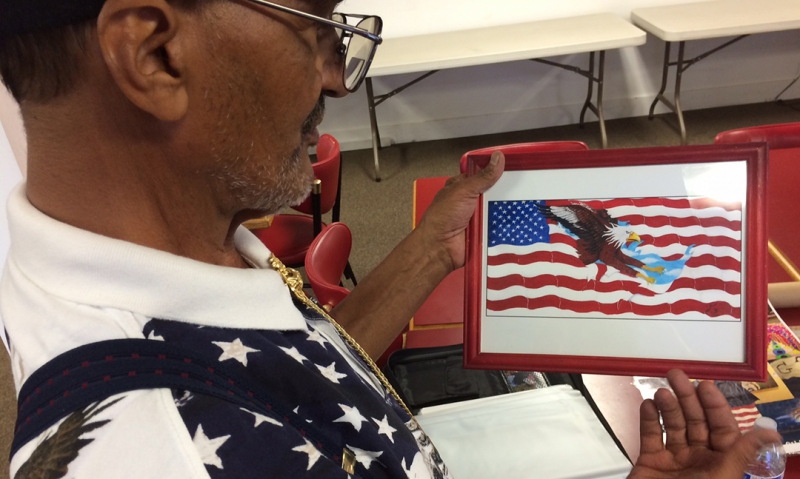
A Utah Legionnaire saw something special in homeless veteran Eugene Morris, who is now clean, sober and creating artwork.
When Marine Corps veteran Eugene Morris left the service after Vietnam, he got married and started a family. Before too long, his life would begin to unravel.
Morris didn’t realize it at the time but his post-traumatic stress disorder sent him in a downward spiral, eventually leading to stints in prison and homelessness.
“I didn't know that I had PTSD and a whole bunch of other symptoms when I came back,” said Morris, who lives in Ogden, Utah. “It took a toll because I didn’t know exactly what to do. I came back lost. My pride would never let me ask for help. I was kind of a country boy growing up in the country so we have always been able to hold our own there.”
Morris was homeless for nearly 17 years. A few years ago, he was facing a lengthy prison sentence for his involvement with drugs.
In stepped National Executive Committeeman Terry Schow.
They first met about 10 years ago when Schow was on the board of the Homeless Veterans Fellowship, a transitional facility in Ogden. Schow had met many homeless veterans but saw something special in Morris.
“As you try to shape them or put them in a box to get them where they need to be, you get them pretty close to where they want benefits,” Schow said. “But I saw in Eugene a different guy. Obviously he's a very respectful, polite kind of person. I just saw something in him that said that this is a fellow that we could save. We could make a difference.”
When Morris stumbled and was facing prison, Schow testified on his behalf and set up a specialized treatment program. He convinced a judge that Morris deserved a second chance.
Morris flourished, working with other veterans, including the homeless. He developed mentoring skills and refined his artistic skills. Schow also gave Morris some work as a painter and plasterer.
“He still helps me today with different things,” Schow said. “I've got a bad hip so I can't do some of those kind of things but he's become kind of like a part of our family. We have him come to Thanksgiving and Christmas things. But he's a goodhearted man and he's one of the success stories that show that VA homeless programs can and do work.”
When he lived on the streets, Morris was involved with Cripple Quill – a group of homeless artists who would put their work on public display. Eventually, the city shut down the dilapidated building that served as their makeshift studio. Later, a local nonprofit group donated a warehouse for their workshop.
Today, Morris continues to create unique works - watercolor, oil painting, acrylic, airbrush - in his own style.
“I do a lot of it for just recreational stuff because that's what I like to do,” he said. “It's a therapy thing for me actually. It doesn’t allow me to go back and drown in my own little pity party. It keeps me focused where at least I'm going toward a goal, to achieve a goal.”
His next goal is to become a peer counselor with VA. “It makes me feel awesome because I'm a people's person and I love doing things to help other people. First, I had to help myself first and thank God there are people like Mr. Schow, otherwise I would not be here now.”
For Schow, seeing Morris blossom was well worth the investment. “We have to be willing to take some personal responsibility and reach out and help folks like Eugene,” Schow said. “Eugene has no other support system up here. He has no family here. All of his family is back east and so we felt it was kind of helpful.”
Even when Morris lived on the streets, he envisioned having his own home. He just couldn’t visualize the path until Schow came into the picture.
“It was kind of a like a dream,” Morris recalled. “I really had kind of always wanted to own a piece of property, but to have a roof over my head after not having it so long, I'm grateful.”
- Homeless Veterans

